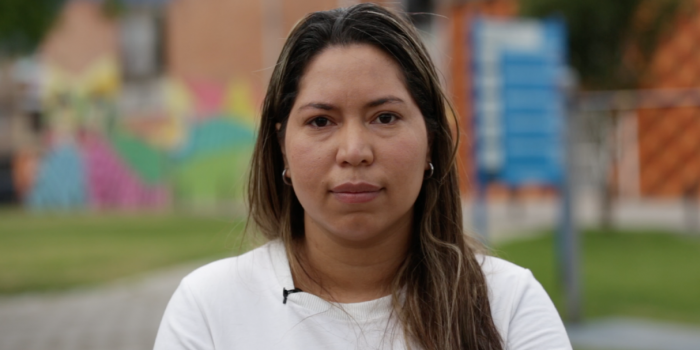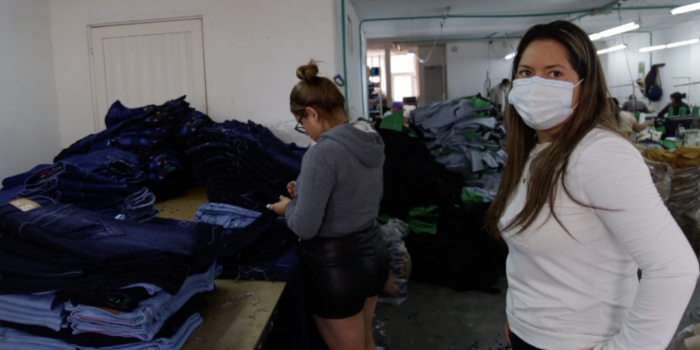
From being a displaced person to entrepreneur and lawyer
On Women's Day, Leivis Ariela Vergara’s testimony, a conflict’s victim who, after working in domestic service, construction and restaurants, is now a lawyer and has a garment factory where armed conflict survivors and female household’s heads work


“Next!”. Someone says. Leivis Ariela Vergara's heart races like an embroiderer. Her six months of pregnancy get up from the sofa, where she has been waiting an hour for that call. She enters a room. Her black pants and jacket and her gown curuba-style blouse make presence and take over the venue. Four jurors are listening. The scene resembles a Shark Tank episode, negotiating with sharks, that ABC network reality or tv-reality show, where entrepreneurs expose their ideas waiting an investors group to inject future into it. This is Leivi’s reality, but without the TV. She is an assistance subject; her business project must be considered a praised object. The target is the SENA Entrepreneurship Fund. Her entrepreneurship idea’s value, distribution, marketing and profits try to sew a future, because only she knows what the past has cost her.
Costs
When the XXI century dawned, some small towns, villages and settlements not far from Corozal municipality, in the department of Sucre, where Leivis lived, were devastated by the paramilitary and guerrillas’ hordes. What happened in Palo Alto (April 14th, 2000), Chinulito (September 13th, 2000), Chengue (January 17th, 2001), Libertad (1997 and 2000) due to paramilitary absurdity, and Coloso (October 8th, 2001). 2004) due to the Farc’s irrationality, embarrassed the national press headlines.
At the end of 2006, the Leivis’ family could have been an unfortunate scoop. They were victims from both terror factions: the self-defense groups burned her grandfather's house twice and the guerrillas threatened her father, Uriel Vergara because of an Army mistake.
He was an elementary school teacher who taught several subjects. His sessions were taught on villages where schools have wind walls, and any shade can be the roof. At dawn and in his blue Nissan, he used to pick up eight colleagues who taught classes like him. He would get them close to the villages and pick them up again at the end of the day right on time; a task they acknowledged with a monthly payment.
One day when the guerrillas and the Army were fighting, some soldiers took her father's car to follow the insurgents. That act made Uriel a target for the armed group. A week after the Army left the area, the guerrillas arrived at the school where he worked to kill him. They tied him up and blamed him of being a Public Force collaborator, the typical terror strategy used in many regions of the country. In the end, the community proved the car had been taken by the military against his will, that is how they stopped Uriel from being another sad number in the conflict.
“When the self-defense groups began to demand money, we had to move. Because of their roots and despite they were stripped of their lands, my grandparents decided to stay in Corozal. I left first because the night they were celebrating the Maja Colombia beauty contest, they approached me in the town park an put me in a truck, where they held me for about three hours before releasing me. They sent me to Bogota the next day,” Leivis recalls.
Sadly, Leivis and her grandparents did become armed conflict figures. According to the Single Victims Registry, they are part of the 1,407 people who suffered land dispossession in the department. At the same time, they belong to the 28,075 who have been plundered throughout the country. Leivis is one more from the 291,893 people displaced from Sucre and she is also within the 8,101,759 who suffered this inner exile in Colombia.
Distribution
In Ciudad Bolivar (Bogota’s 19th Precinct), Leivis knew she had to manage expenses and time well; she realized since she didn´t know a trade, she had to do domestic labor. She herself was the product to sell. The corozo, the cheese mote, the diabolines (a kind of sponge cake) and the Maja Colombia beauty contest were all behind. However, she contacted an employment agency in a beautiful manner and got a job as a maid in a family home. This is how she distributed her expenses well: the main and most urgent, housing and food, were paid by her employers; the others, by her. Her life quality even improved a little, from Ciudad Bolivar she moved to a house in Alamos.
Her mother, Luz Mery Zuñiga, arrived at Bogota a year later. She had separated from her husband, who preferred carrying a little school in his heart and stay close to his students. She followed her daughter's path and became a maid; Luz Mery did well, but Leivis, not so much.
Without searching for it, she learned she could declare her armed conflict victim status. She met her current partner and father of her two daughters doing one of those lines to request help because she had been displaced from her home. He did not only guide her in these procedures, but he also supported her to leave her two-year job as a maid.
Marketing
Leivis knew that, to improve product commercialization, she needed to develop techniques and have studies that focused on that objective. She was still the product to sell. "I worked for days ironing clothes or cleaning, in construction, in grills and in restaurants."
Despite knowing about that kind of work, she lacked the skills and studies. “Around 2010, I wanted to learn a trade, an art, because working in family homes one finds people who don’t treat people very well, who humiliate. But one day I saw SENA was offering a flat sewing machine course and I
signed up. I learned to sew, to operate that machine, the filleting machine and also the collar one.”
With her mind set on marketing, at the end of the course she applied to a productive project open call. She was favored with another course and a million and a half pesos, which she used to buy the cheapest machines: the flat machine, the one for straight seams and the filleting machine, which prevents the fabric from fraying. At last, she had the technique, some studies (still wanted more) and the machines. She set up her tailoring workshop and began to embroider her future: she mended clothes, changed zippers and reduce jeans´ legs.
In 2013, she learned about the Access, Permanence and Graduation in Higher Education Reparation Fund aimed at the armed conflict victim population, an association between Icetex and the Unit for the Victims. She applied and because of it she was able to study Law, although her first objective was to study Fashion Design. “My husband also benefited from the same Fund, and he studied Law too. He was displaced from the Corazon village in the municipality of Ortega, Tolima; a beautiful place, but difficult to get to, where there was a lot of fighting due to the presence of guerrillas and paramilitaries.”
She studied at night, from Monday to Friday from January to December, which allowed her to do three semesters each year. She graduated in three years.
Through an outsourcing company, she worked in the Unit for the Victims and, while working there she discovered an open call from the SENA Entrepreneur Fund. She prepared to present her Jolie Fashion project, a custom-made jeans small business. She dressed in black pants and jacket for that appointment with her fate known as pitch.
Profits
After laying out the costs, distribution, marketing and profits, Leivis convinced the jurors. Her business idea was profitable and groundbreaking.
However, she needed a second open call to achieve her desire: $136 million pesos as seed capital to boost her enterprise. "The money is not given to the person. What happens is you give the information about what is needed in the project, what machinery is going to be bought, how many jobs are required, what raw material is needed, etc. As everything becomes a requirement, they inject the capital,” says Leivis.
Her idea's birth certificate is almost three years old. She gave birth to it in the Venecia neighborhood, but in 2020 she moved to Policarpa. All this process until she invested the whole amount concluded in May last year, when the pandemic forced her to change the goal and restructure the business idea. "I manufactured biosafety masks and coveralls due to a contract that was settled with an entity."
The business has been reactivated, it has more contracts and now she has 15 workers, and some of them are female household heads and armed conflict victims. Thus, fulfilling her motto: "I try to empower women."
Leonela Ortega is a witness to that ideal, who, for almost three years, has been able to face her own displacement status thanks to her work at Jolie Fashion. "I have done very well here since I arrived. I learned here, they taught me, I was able to bring my family and I am very grateful."
Despite her motto, the least she is clear about is helping those who need and deserve it, which is why she not only helps women. “I have been working with them for about two or three years, and because of them I was able to get a house with my father,” says Sergio Calderon, a displacement victim.
Leivis is aware knowledge creates profits in any sense of life, that’s the reason she doesn’t give up her purpose to keep preparing more and more each day. Now, with her own resources, she is doing a Contract Law Specialization and she wants to do a PhD one day. “We women are very bold and brave; we have to know ourselves, and that self-knowledge will give us the ability to identify our characteristics and our strengths. When we identify them, we can improve that virtue to move forward, we realize we can do it,”, she affirms with conviction.
She also acknowledges the value of not forgetting her origins, that is why when she gets sad or worried, she turns on her sewing machine at home and makes something, some shorts, sweats, a blouse or maybe a new business idea. "It is my therapy."
(End/EGG/CMC/COG/RAM)






